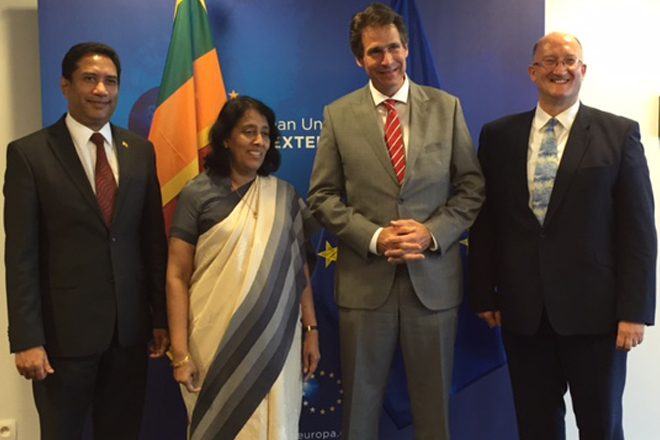Sri Lanka’s progress on commitments important for GSP+, euro 210 mn grants: EU

July 20, 2016 (LBO) – European Union has drawn the attention of Sri Lankan officials to the importance of continued positive progress in fulfilling Sri Lanka's commitments in parallel to obtaining GSP+.
At the 20th European Union-Sri Lanka Joint Commission meeting which took place in Brussels on 19 July 2016, the representatives of EU welcomed Sri Lanka's GSP+ application as a sign of renewed commitment to meeting its wider international obligations.
The meeting was co-chaired by Secretary of Foreign Ministry, Chitranganee Wagiswara and Managing Director for Asia and the Pacific at the European External Action Service, Gunnar Wiegand.
The parties also discussed the procedure for assessing the GSP+ application, which was presented to the EU at the end of June, in line with the GSP Regulation.
The parties have noted the progress made in terms of UN resolution and indicated that further measures would be pursued and progress would continue for the implementation of the resolution.
Sri Lanka co-sponsored with other UN Member States for a UN Human Rights Council resolution on 1 October 2015.
Progress with regard to the land release, the repeal of the Prevention of Terrorism Act and establishment of the mechanisms for truth, reconciliation, justice and reparations were also discussed.
Meanwhile, the European Investment Bank has announced that it was currently negotiating a €50 million (Rs8.2bn) concessional loan with the Government of Sri Lanka for Greater Colombo Wastewater Project.
The EU has also reiterated its plans to widen its 2014-2020 development programme €210 million (Rs34.4bn) beyond rural development to provide grants for reconciliation and good governance.
The Joint Commission, which oversees the 1995 EU-Sri Lanka Cooperation Agreement on Partnership and Development, deals with a broad range of bilateral and multilateral issues of mutual interest.
Its tasks are to: ensure the proper functioning and implementation of the Agreement; set priorities; and make recommendations.
There are three Working Groups established under the terms of the Joint Commission namely, the Working Group on Governance, Rule of Law and Human Rights, the Working Group on Trade and Economic Cooperation Issues, and the Working Group on Development Cooperation.
The parties have also agreed on a series of actions for follow-up before the next Joint Commission meeting in Colombo in 2017.
